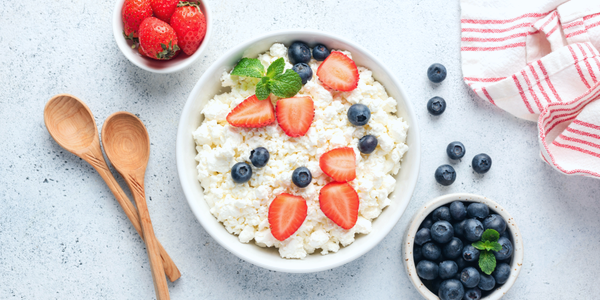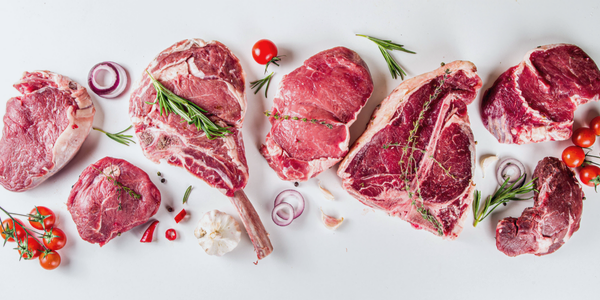
The rise in popularity of Greek yogurt may have left the more humble cottage cheese unnoticed when strolling down the refrigerated aisle.
However, cottage cheese should not necessarily be overlooked. Incorporating cottage cheese into meals and snacks may be beneficial for many reasons including weight loss, bone health, and promoting muscle mass.
Learn more about why cottage cheese should not be passed over in the dairy section along with unique ways to add it to other dishes.
Cottage Cheese Nutrition
Cottage cheese is a fresh, soft cheese made by first adding acid to milk. The addition of acid is what makes the curds and what separates the whey.
The end result curd size, fat, and sodium content can vary amongst different types of cottage cheeses. However, no matter these variances, cottage cheese is an excellent source of calcium, protein, and B vitamins.
Cottage cheese nutrition per 1 cup of 1% cottage cheese includes:
• 214 calories
• 9.4 grams (g) fat, 14% Daily Value (DV)
• 24 g protein
• 7.4 g carbohydrates
• 36 mg (milligrams) cholesterol, 12% DV
• 792 mg sodium, 33% DV
• 18% DV calcium
• 14% DV vitamin B12
• 5% DV vitamin B6
Overall, cottage cheese nutrition varies mostly based on the fat content much like skim and whole milks. This will naturally influence saturated fat, total fat, and calorie content. Sodium content can also vary based on the salt added.
Cottage Cheese Benefits
Cottage cheese benefits muscle-building, bone and heart health, and weight loss. Below details the health benefits of cottage cheese and why adding cottage cheese to the diet may be advantageous.
Muscle Building
Following workouts, good nutrition is critical for a healthy recovery. Dairy products such as cottage cheese provide essential protein and healthy carbs that help support muscle growth and promote lean body mass.
Eating cottage cheese can help with both building muscle and weight loss according to a 2011 study. Researchers found higher protein and dairy product intakes promote more favorable body composition changes in women characterized by greater total and visceral fat loss and lean mass gain.
Bone Support
Being a dairy product, cottage cheese is rich in calcium. Consuming adequate calcium is absolutely necessary for bone support throughout the lifespan, also including the maintenance of strong teeth.
Cottage cheese’s phosphorus content further preserves both bone and teeth integrity.
Heart Health
Cottage cheese contains vitamin B-12, a vitamin occurring naturally in animal-based products. Vitamin B-12 has been shown to remove homocysteine in the blood, an amino acid presented to increase heart disease risk if elevated.
Calcium also promotes normal muscle contraction, including the muscles of the heart. To make cottage cheese a blood pressure-friendly food, choose lower-sodium cottage cheese. Check nutrition fact labels on available packages in the store to determine which option is the lowest in sodium.
Weight Loss & Management
The intake of cottage cheese can certainly lead to weight loss, largely related to its high protein content while remaining low in calories.
Diets rich in protein, without containing large amounts of calories, foster weight loss by primarily inducing satiety. Elevated feelings of fullness can ultimately prevent overeating, especially on tempting foods lacking in nutrients. Choosing low-fat or fat-free cottage cheese can reduce calorie intake without compromising protein content.
Below are unique ways to use cottage cheese. For best weight loss options, pair cottage cheese with other protein foods, fruits, vegetables, or whole grains.
11 Unique Ways to Use Cottage Cheese
If sitting down to a bowl of cottage cheese does not sound appetizing, these unique ways to use cottage cheese can provide all cottage cheese health benefits in delicious ways.
1. Fluff up your eggs.
2. Create a healthy pancake breakfast with three ingredients.
3. Pair with fruit, including fresh pears and pineapple slices, for a well-balanced snack.
4. Mix into smoothies to enhance creaminess and protein content.
5. Healthify a banana split.
6. Swap out mayonnaise in tuna and chicken salads.
7. Use cottage cheese as a salad topping instead of shredded cheese.
8. Indulge in guilt-free cottage cheese ice cream.
9. Combine into pasta sauces for a cheesy, creamy dish.
10. Smear on whole-grain toast with tomato and/or avocado slices.
11. Offer protein and creaminess to guacamole.
In Summary: Is Cottage Cheese Healthy?
Cottage cheese is a high-protein dairy food that can get overshadowed by the now popular Greek yogurt. However, cottage cheese can offer many health benefits that should not be overlooked.
Cottage cheese is a great source of protein, calcium, and B vitamins which offer muscle-building, heart and bone health, and weight regulation benefits. Fat and sodium content can vary, so check labels on cottage cheese packages for the lowest contents of these nutrients if desired.
Cottage cheese has a slightly salty but neutral flavor making it a versatile ingredient for many unique meals and snacks. Cottage cheese can also be used as a substitute for mayo, sour cream, or Greek yogurt.
Reference:
What Is Cottage Cheese? Undeniably Dairy. Published June 24, 2016. https://www.usdairy.com/news-articles/what-is-cottage-cheese.







